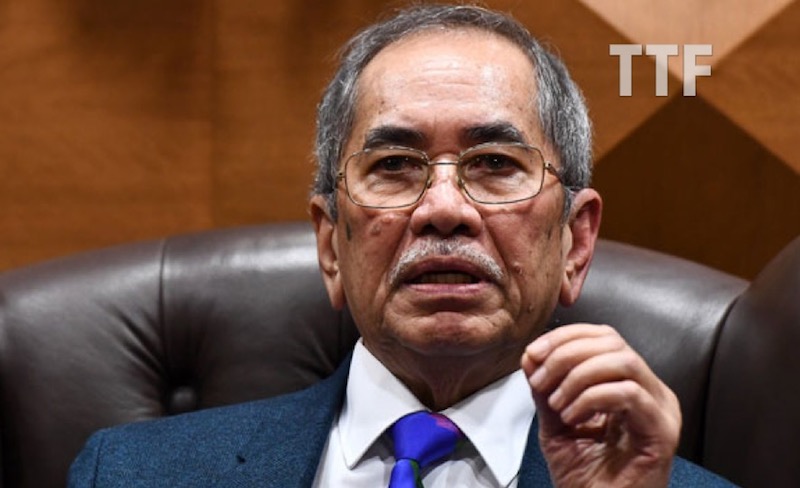
ڤڠامڤونن نجيب: اڬوڠ اد كواس بودي بيچارا مطلق
UNTUK BERITA TERKINI, SERTAI TELEGRAM TTF DI SINI
Wan Junaidi said given that Najib’s trial took place in the Federal Territories of Kuala Lumpur and Putrajaya, the power to grant a pardon lies with the Yang di-Pertuan Agong.
He cited Article 42 (1) of the Federal Constitution, which states that the Yang di-Pertuan Agong has the power to grant pardons, reprieves and respites in respect of all offences that have been tried by court martial and all offences committed in the Federal Territories of Kuala Lumpur, Labuan and Putrajaya.
Wan Junaidi also shot down the view that in the case of royal pardons, it is the prime minister, apart from the Yang di-Pertuan Agong, who plays the largest role.
“After the Yang di-Pertuan Agong, the other individual within the Pardons Board with the most significant role is the A-G.”

Umno’s announcement that it would apply for a royal pardon for jailed former prime minister Datuk Seri Najib Razak has triggered an intense debate over the legality and morality of such a move.
Some have noted a possible conflict of interest involving Prime Minister Datuk Seri Anwar Ibrahim and the Yang Di-Pertuan Agong, and others have questioned whether Najib has served enough time to warrant a pardon bid.
Datuk Seri Wan Junaidi Tuanku Jaafar, who was former minister in the Prime Minister’s Department (Parliament and Law), discusses the burning questions.
On Thursday, Umno sprung a surprise when it announced that it would ask Yang di-Pertuan Agong Al-Sultan Abdullah Ri’ayatuddin Al-Mustafa Billah Shah to grant a pardon to Najib, who is serving a 12-year jail term for corruption.
Najib’s lead counsel, Tan Sri Muhammad Shafee Abdullah, said he would be use the dissenting judgment of Federal Court judge Datuk Abdul Rahman Sebli to support the application.
WATCH: ADA KEMUNGKINAN PARLIMEN BUBAR PADA ATAU SEBELUM JUN TAHUN INI JIKA NAJIB TIDAK DIAMPUNKAN (PENDEDAHAN)
Wan Junaidi, however, said that under Regulation 113 of the Prisons Regulations 2000, which comes under the Prisons Act 1995, Umno has no legal standing to submit an appeal for a pardon on the former party president’s behalf.
“According to the regulation, the petition can be filed only either by the prisoner himself or his immediate family members, the latter meaning his wife or children.
“This also means that the party or even his lawyer cannot petition on his behalf,” said the former Santubong member of parliament.
CONDITIONS FOR PARDON
Asked if a prisoner has to meet certain conditions in order to apply for a royal pardon, Wan Junaidi responded in the negative.
“No. A petition under Regulation 113 has no conditions. The only condition is that if the person fails to be granted the pardon, reprieve or respite, he or she has to wait for two more years before another petition can be made.”
He said supporting documents for a pardon may come from the Prisons Department, where under Regulation 45 of the Prisons Regulation 2000, an officer will prepare a report on the prisoner every four, eight, 12 or 16 years of the sentence, and every and subsequent year thereafter.
The report would include statements by the officer in charge and medical officer on the work and conduct, as well as the mental and physical conditions of the prisoner.
PARDON AT KING’S ABSOLUTE DISCRETION
Wan Junaidi said given that Najib’s trial took place in the Federal Territories of Kuala Lumpur and Putrajaya, the power to grant a pardon lies with the Yang di-Pertuan Agong.
He cited Article 42 (1) of the Federal Constitution, which states that the Yang di-Pertuan Agong has the power to grant pardons, reprieves and respites in respect of all offences that have been tried by court martial and all offences committed in the Federal Territories of Kuala Lumpur, Labuan and Putrajaya.
“The composition of the Pardons Board for Najib’s case, among others, will include the prime minister and the attorney-general (A-G).
“The board will include three other members, who are neither members of parliament nor politicians.
“These three members will be appointed by the A-G after receiving the consent of the king.”
Wan Junaidi said the Pardons Board would meet in the presence of the Yang Di-Pertuan Agong, who will preside over it.
The board, he said, when deliberating on the petition, would also study written reports by the A-G and the Prisons Department director-general before tendering its advice to the Yang di-Pertuan Agong.
“His Majesty will be present when the board deliberates on the case. His Majesty will hear all the briefings and look into the report.”
A-G, NOT PM, WIELDS MORE POWER
Wan Junaidi also shot down the view that in the case of royal pardons, it is the prime minister, apart from the Yang di-Pertuan Agong, who plays the largest role.
“After the Yang di-Pertuan Agong, the other individual within the Pardons Board with the most significant role is the A-G.
“The granting of a royal pardon is not within the scope of the administration or the executive.
“As such, in the matter of an application for a pardon, the A-G will provide his legal opinion and advice from the A-G’s Chambers.
“However, even with the advice, the Yang di-Pertuan Agong has the absolute authority to decide on his own whether he wishes to issue a pardon or otherwise.
WHAT NAJIB MAY INCLUDE IN HIS PETITION
Wan Junaidi believes Najib will include the dissenting judgment of judge Rahman in his petition for a royal pardon.
He also he believes that Najib will question the suitability of the sentences meted out to him as among the grounds for seeking a royal pardon.
Rahman, in his 78-page written judgment, had said the previous Federal Court bench was likely to have been unfair to Najib when it dismissed his appeal against the conviction and sentence in the SRC International Sdn Bhd case when he was not legally represented.
Rahman, who chaired a five-member bench of the Federal Court, had said the proper order against Najib would have been an acquittal and discharge from all the offences that he was charged with.
He had also said it appeared clear to him that there had been a miscarriage of justice as the applicant (Najib) had been “deprived of a fair hearing”.
“Justice is not only about the guilt or innocence of the accused person. It is also about according him a fair trial.
“The accused person should feel that he has had a fair trial.
“If he cannot be tried fairly for the offence that he is charged with, he should not be tried for it at all. Denying the accused a fair trial is a grave form of injustice,” he said in his minority judgment.
In the 4-1 majority judgment, the four judges who dismissed the former prime minister’s application were Federal Court judges Datuk Vernon Ong Lam Kiat, Datuk Rhodzariah Bujang and Datuk Nordin Hassan, as well as Court of Appeal judge Datuk Abu Bakar Jais.
POSSIBLE OUTCOMES
After being briefed and upon studying all the necessary reports, Wan Junaidi said the Yang di-Pertuan Agong would preside over the petition.
“Based on his judgment and wisdom, His Majesty could deliver one of three verdicts.
“The king can either grant the royal pardon, reduce the sentence or offer a reprieve,” he said.
(A reprieve means the sentence is delayed.)
Wan Junaidi said once a person was pardoned, it would wipe the slate clean, as if the offence was never committed.
“In the (Federal) Constitution, there is no such thing as a full or half pardon. There is no such term as a ‘full pardon’ as it is not available in the Constitution. When a person is pardoned, this means he or she has received a full pardon,” he said.
CONFLICT OF INTEREST
Wan Junaidi also responded to suggestions of a possible conflict of interest in the case since the Yang di-Pertuan Agong is the sultan of Pahang and Najib is a dignitary from the state.
“The legal position of the Yang di-Pertuan Agong in the federal-level Pardons Board is enshrined in Article 42 of the Federal Constitution.
“The fact that Najib is an Orang Besar Negeri Pahang does not amount to a conflict of interest regarding the Yang di-Pertuan Agong in considering his case,” he said.
Asked if the Yang di-Pertuan Agong can delegate his power to the Deputy Yang di-Pertuan Agong to chair and preside over the petition, Wan Junaidi said the matter was not stated in the Constitution.
“Therefore, His Majesty’s position cannot be delegated to his deputy since there is no mention in the Constitution that such powers can be exercised by the Deputy Yang di-Pertuan Agong.”
Wan Junaidi also rejected claims of any conflict of interest in Anwar’s role on the board.
“There is no conflict of interest for a prime minister or menteri besar in sitting on the Pardons Board (at federal or state level) as this is required by the Constitution,” he said.
A conflict of interest, he said, may occur if the person who petitioned for a royal pardon has a familial relationship with those on the board and presiding over the case.
The most important factor, stressed Wan Junaidi, was that the Yang di-Pertuan Agong has the absolute privilege to decide on the application for a royal pardon.
“This is despite whatever the stand or position of the Pardons Board, the opinion of the A-G or the recommendation of the Prisons Department D-G might be.
“The Yang di-Pertuan Agong’s power of granting a pardon under the Federal Constitution is absolute and unfettered by any extraneous matters,” he said.
News source:
Title:




